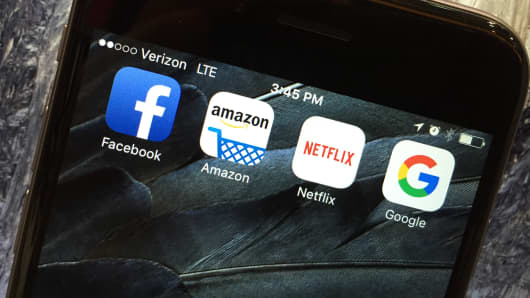The saying goes one should quit when you are winning. This might hold true for many trades, but there is one trade for which this should be ignored.
It's the so-called FANGs, or Facebook, Amazon, Netflix and Google (through parent company Alphabet).
The FANG stocks have returned nearly 30 percent year-to-date versus 8 percent for the S&P 500. According to a note from Bank of America Merrill Lynch last week: "Active managers continued to double down on tech (with their exposure increasing by +12.6 percent in the first quarter) along with a 71 percent overweight in FANG stocks."
What is more remarkable is that the latter stayed steady over the last year, but the rally in FANGs has been driven by active managers who were once bearish on the trade, throwing in the towel and covering their short positions.
Resistance is futile, it seems.
Yet, the warnings of exuberance have been plentiful. And those warnings are not new. For years have we been reminded of the similarities to the 2000 tech
We have also been warned about the narrow leadership in the S&P thanks to tech, now that the reflation trade is flagging. In my view, the word narrow misses the point. These firms have higher market capitalizations than the German DAX index and the French CAC. I would call that impressive leadership. Lastly, we have we been hearing about of the sky-high valuations of the tech sector for years. Most recently that the price-to-earnings ratio of the U.S. tech sector hit 27, which is deemed outrageously expensive for any other sector.
One of the analysts ignoring the argument of excessive valuations is Cyrus Mewawalla,
Even more so, it seems like a few winners will take it all. According to Mewawalla, all the big themes that are coming out in the next two years, are benefitting the big ones much more than the broad tech sector.
Take cloud computing for example, which requires
Mewawalla adds that he has a "buy" rating on all FANG stocks and does not think any of them are overvalued.
Mark Hawtin, investment director at GAM, goes one step further by saying recently on CNBC that the FANG stocks are still cheap despite hitting consecutive record highs, adding Facebook is the cheapest stock in his portfolio on a price-to-growth basis.
The message from the investment community is clear. Follow the leader, follow this rally. It might be frustrating if you haven't been in it from the start, but it is not too late. This tech rally which has been defying all
Carolin Roth is based in London and is an anchor for Street Signs as well as covering the Swiss market for CNBC. You can follow Carolin on Twitter @CarolinCNBC.










